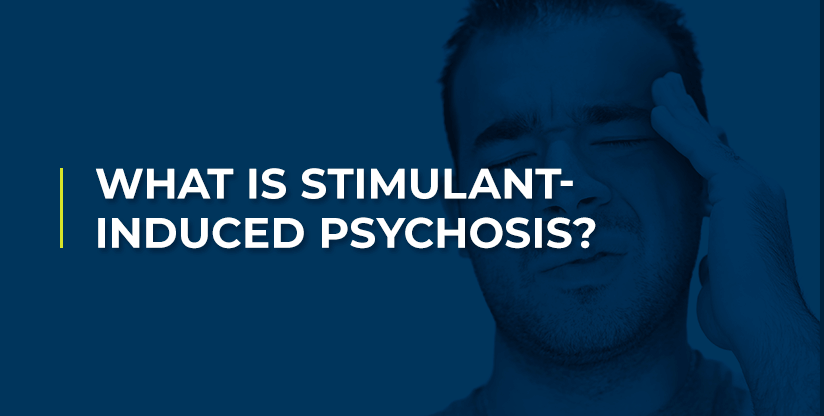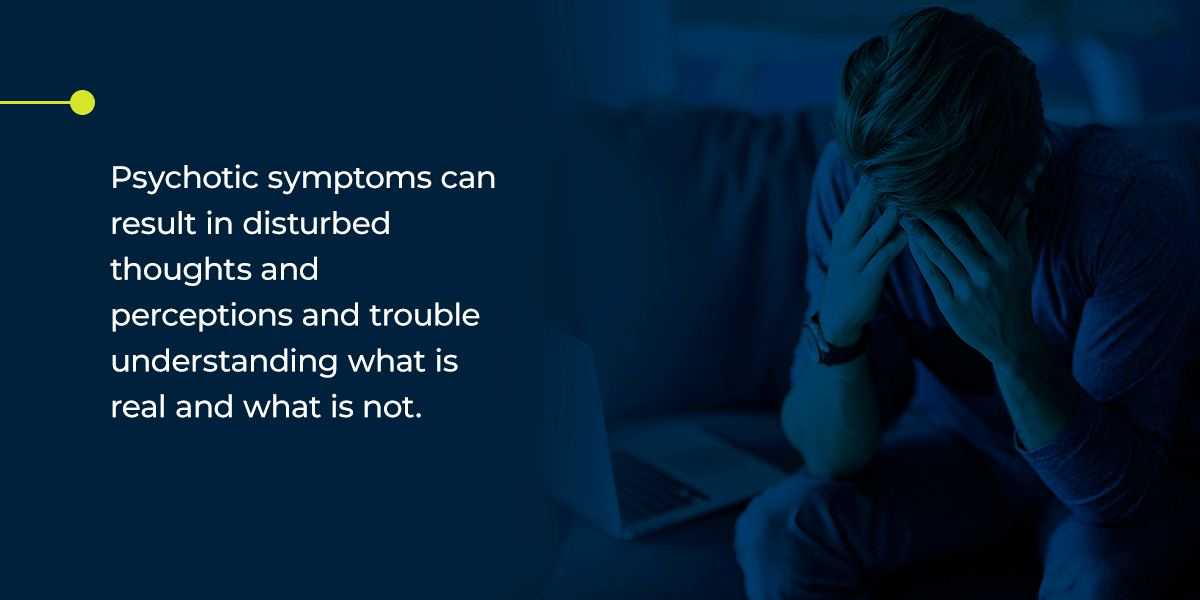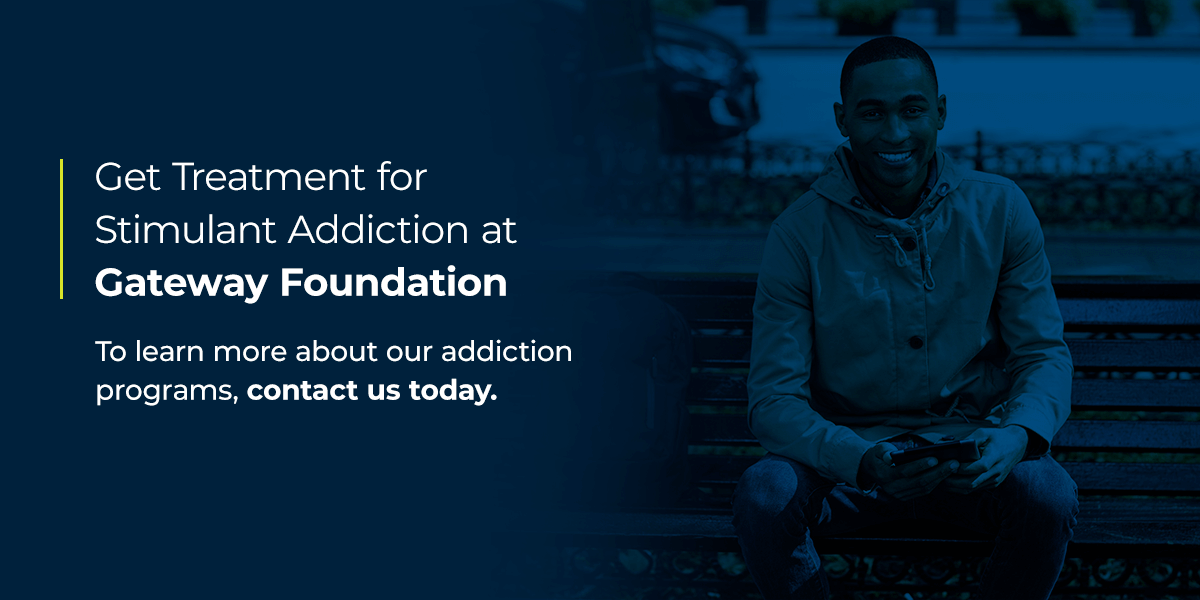- Mar 29
- AddictionMental Health Treatment

Stimulant-induced psychosis can disrupt a person’s sense of reality, leading to distressful symptoms like delusions and hallucinations. Anyone can experience the condition if they take too much of an illicit substance like cocaine or misuse a prescription like Adderall. Learning more about psychotic symptoms and signs of addiction can help you or someone you know prevent stimulant-induced psychosis and receive treatment.
Failing to address psychosis or addiction can disrupt a person’s work, school, and personal life. Fortunately, substance use disorder treatment takes a holistic approach to address symptoms of your addiction, including psychosis.
What Is Psychosis?
Psychosis is a term used to describe conditions that impact the mind and cause a person to lose contact with reality. While psychosis can develop due to mental illness, some people experience stimulant-induced psychosis from overusing illicit or prescribed stimulants.
Psychotic symptoms can result in disturbed thoughts and perceptions and trouble understanding what is real and what is not. Stimulant-induced psychosis occurs when a person experiences delusions or hallucinations soon after ingesting or withdrawing from a substance. It can also occur shortly after exposure to a medication.

Common illicit drugs associated with stimulant-induced psychosis include amphetamines, methamphetamines, and cocaine. Misusing prescription medications like Adderall, Ritalin, and Vyvanse® is also related to the development of psychosis. During a psychosis episode, a person may see, hear or believe things that aren’t real. They might also have strange and persistent thoughts, behaviors, and emotions.
While symptoms can differ depending on the person, psychosis is often a very overwhelming and distressing experience, making it essential to get help if you or someone you know is struggling with addiction.
What Causes Stimulant-Induced Psychosis?
Researchers believe stimulants might cause psychotic symptoms because they increase dopamine, which regulates many brain and nervous system functions, including perception. When ingested, stimulants bind to dopamine transporters and impact the prefrontal cortex, affecting executive functioning and cognition.
Examples of stimulants include caffeine, amphetamines, nicotine, cocaine, and methamphetamines. These substances impact the central nervous system, sharing side effects like increased blood pressure, agitation, and psychosis. While stimulants like caffeine have a mild effect on dopamine, amphetamines, and cocaine significantly impact it. As a result, caffeine rarely induces psychosis, while cocaine and amphetamines are more likely to do so.
Stimulants can also cause increased heart rate, alertness, and energy, so they are often prescribed for conditions like attention-deficit/hyperactivity disorder (ADHD), narcolepsy, and depression. A person’s risk of experiencing psychosis symptoms increases when they do not take these medicines as prescribed.
Some people are at higher risk of developing the condition as well, depending on the following factors:
- Genetics and neurochemistry, such as certain genes
- The specific substance ingested
- The drug’s dosage
- Stress levels
- Sleep deprivation
- Underlying mental illnesses, particularly schizophrenia
Substance-induced psychosis often results from increasing an amphetamine dosage in a short amount of time. People who experience the condition might take amphetamines several times over a few days, resulting in a buildup of the substance in the body, leading to psychosis. Other studies show a strong relationship between schizophrenia and stimulant-induced psychosis. Patients with the condition or family history are more prone to psychotic symptoms when taking stimulants.
Signs of Stimulant-Induced Psychosis
You might notice a few signs before a stimulant-induced psychosis episode occurs. People with psychosis often behave in confusing ways and can become aggressive or violent toward themselves or others. If you see the following behavioral changes, it is essential to seek help:
- A decline in self-care or personal hygiene
- Decreased work or school performance
- Lack of concentration
- Trouble thinking
- Suspiciousness or paranoid ideas
- Uneasiness around people
- Withdrawing from social activities
- Difficulty separating reality from fantasy
- Trouble communicating or confused speech
- Lack of sleep or oversleeping
Recognizing the warning signs can help determine whether a person will enter psychosis. Stimulant psychosis symptoms can include:
- Delusions: Delusions are characterized by untrue and unshakeable beliefs that the person with psychosis insists are true. Delusions can occur in various forms, including paranoid or grandiose delusions.
- Hallucinations: Psychosis can cause hallucinations or sensations that aren’t real. Hallucinations can affect all five senses, most often starting with hearing and seeing things that are not there.
- Disorganized thinking: It’s common for people with substance-induced psychosis to display confusing patterns of thought and inappropriate social interactions.
Acute psychosis occurs within four to five days after intoxication, with symptoms resolving with abstinence. Others can experience stimulant-induced psychosis lasting up to a month, while some may never fully recover from the symptoms.
When to Get Help
It’s time to seek professional help if you are taking stimulants regularly or excessively and start to experience psychotic symptoms. Psychosis and addiction warrant your attention, and it is incredibly crucial that both conditions are treated simultaneously. Excessive or chronic stimulant use can lead to addiction and unfavorable outcomes, including psychosis, withdrawal, overdose, and death.
Without professional help, psychosis can disrupt your entire life, causing relationship problems and declining work or school performance. Most importantly, it can put your life at risk — making it crucial that you or a loved one seek treatment as soon as possible. Often, the earlier you get treatment for psychosis, the more effective it’ll be.
Aside from psychosis, there are other symptoms of stimulant addiction you might watch out for in yourself or a loved one. Typically, people who misuse stimulants display the following signs and symptoms:
- Aggression
- Diarrhea
- Nausea and vomiting
- Rapid speech
- Restlessness
- Trouble communicating
- Decreased ability to concentrate
- Irregular heartbeat
- High blood pressure
- Rapid breathing
- Dilated pupils
- Sleep deprivation
- Tremors or shakiness
Psychosis might subside when stimulant use does, or it may continue due to an underlying condition like schizophrenia. Either way, addiction experts can help determine the cause and create a program to help treat you, including therapy, support groups, prescribed medications, and medically-assisted treatment (MAT).
Professionals can help you with psychosis symptoms, addiction, and other co-occurring disorders like schizophrenia.
Get Treatment for Stimulant Addiction at Gateway Foundation
Substance-induced psychosis can range from mild to severe symptoms, presenting in numerous ways. Individuals with stimulant-induced psychosis may have intense hallucinations or delusions. They may also experience changes in their behavior, thinking, or mood. If you or someone you know has symptoms suggestive of stimulant-induced psychosis, it is vital to seek treatment.
Gateway Foundation provides access to professional mental health services for individuals struggling with addiction and co-occurring disorders. If you are experiencing symptoms of stimulant-induced psychosis or signs of addiction, please reach out for help. We can provide guidance and support through diagnosis and treatment.
To learn more about our addiction programs, call us or fill out a contact form today.



